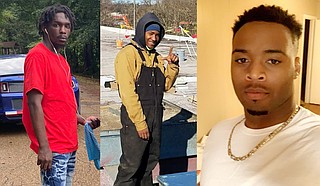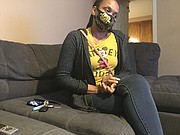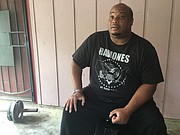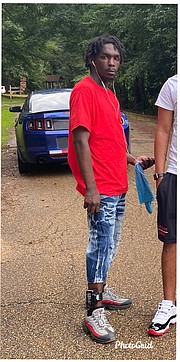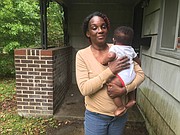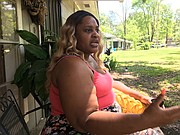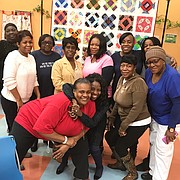Wednesday, June 2, 2021
The tears kept rolling down the face of Shaneika Green, 42, as she spoke to the Jackson Free Press in her house on Colebrook Avenue in Jackson on April 30. She was talking about the July 17, 2020, murder of her son, Tramaine.
Green had participated in a gathering at Jackson City Hall on April 25 where families of gun-violence victims came together with city leaders and law enforcement officials to decry the spate of violence in the capital city, which has recorded more than 50 homicides in the first five months of 2021.
At the April event, the mother-of-six said people came to her son's house, chased him from there around 3 a.m. and shot him seven times. He later died at about 3:30 p.m. that same day.
"It was several boys that chased him down. He was shot seven times," she told the crowd at city hall. "All I want is for my son's killers to be (caught) so that I can get justice, so that I can get peace, So my kids, his siblings could get peace. So his nephew could get peace. That's all I want."
"All I want is for them to find the killers. I want justice. It's been almost a year; I have not had a good eight hours of sleep since this happened."
The mother mentioned her disaffection with the police's handling of the case and how the Jackson Police Department is not communicating with her about her son's case. Green does not even know the name of the detective presently in charge of the case, and she has asked
Radio silence from local law enforcement is a common and historic complaint the Jackson Free Press has long heard from family members who lose their loved ones to gun violence in Jackson.
"It's almost been a year. I hadn't heard any update about what's going on with his case; this was my firstborn. When they took my son away from me, they took a piece of my heart," Green said. How Police Should Respond
Oresa Napper-Williams was taken aback when she learned that a victim's family may not know the detective in charge of their child's murder case in Mississippi.
Napper-Williams, a native of Brooklyn, N.Y., started the nonprofit Not Another Child Inc. in New York City after she lost her own son to a stray bullet there. Her own experiences with the New York Police Department weren't ideal; she recalls the officer who first called her on Aug. 6, 2006, to tell her that her son, Andrell Daron Napper, was shot. He actually said to her: "We'll let you know if he was innocent."
Napper-Williams, now an expert on gun violence who works with both families who experience gun violence and the NYPD to help officers better help families, explained in a phone interview on Monday, May 31, what should happen after a family loses a loved one to violence: "So ideally, what happens is when there is a shooting, 911 is called. The local police arrive there along with a detective. Most of the time that detective, whoever's on duty, is given the case at that time."
"And so the detective contacts you. They let you know that they are the detective with the case," she added. "I have never heard in any other city or state that a person doesn't know who their detective is."
Napper-Williams said the quiet part out loud about how families of color are too often treated when they lose a loved one, whether it is being ignored by police or a false implication that your deceased might have been at fault somehow.
"A lot of the lack of communication and no responsiveness with detectives and things of that nature is because of the stigma that comes along with Black and Brown gun violence," she explained. "Any Black and Brown violence, they attribute it to what was that person doing? You know, were they in a gang? Were they selling drugs? You know, anything like that."
"So that stigma that comes along with the lifestyle that's lived in our communities is what makes detectives push back their hand, like, 'we don't have any information for you, nobody is saying anything,'" she added. "So it's easy to sweep things under the rug and never have to really identify anything or any next steps or anything."
Napper-Williams' comments track with studies that show that law enforcement often treat both victims and suspects in a crime in Black and Brown communities like they are both guilty, thus inhibiting thorough investigations and resolution.
The Jackson Police Department, at 9:47 a.m. on the day of Tramaine's murder, posted on Twitter: "#JPD is investigating a fatal shooting after an adult male was found just before 4 a.m., near the intersection of Belvedere Dr. and Freemont St. Victim suffered multiple wounds. No suspect info or motive currently known. Anyone with info, call #CrimeStoppers at 601-355-TIPS(8477)."
'My Son's Case Will Go Cold'
Nine months later, Shaneika Green's frustration is palpable about her son. His mother is particularly irked that those who killed his son "are still walking around." She explained that after the previous detective handling the case left the Jackson Police Department, nobody had informed her of who is on the case now.
"I wasn't notified that the (previous) detective was no longer there," Green said. "The last time I talked to the (last) detective, he told me that my son's case will go cold. Right now, I am afraid because nobody's contacting me, and I don't feel like they're doing anything."
Napper-Williams said her organization bridges the gap between victims' families and New York law enforcement by facilitating a monthly meeting leveraging its relationship with the New York City political and law enforcement leaders.
"Now we have a monthly Zoom (meeting) with the chief of the detectives and the assistants, and you have to RSVP prior because they will make sure that the detective that is on your case is a part of that Zoom with an update," she said.
Green said that since her son (was) murdered in Jackson, she is constantly monitoring her kids to see where they are, worrying about their safety as the impact of the loss continues to linger.
"Right now, I don't trust anybody, and (my children) really don't trust nobody," Green said. In April, she successfully reached the police and spoke with a sergeant.
"I let him know that I haven't been contacted about the detective (who is) no longer employed with them, and I want to know (the) detective on the case," Green said. "And he told me that he was going to call me back at one o'clock that evening. One o'clock came; I haven't talked to him since. That was two weeks ago."
The Jackson Free Press interview was on April 30.
'Momma, I Love You'
Justin McNeal, 24, drove to Madison on March 26, 2021, to interview for a nursing-assistant position in a nursing home there. On his way back, a not-yet-identified person shot him on Interstate 220. One month later, Crime Stoppers announced $11,500 for tips on his killer.
"After the shooting, Justin McNeal's car wrecked in the median between Medgar Evers Boulevard and Industrial Drive," Central Mississippi Crime Stopper wrote in an April 16 Facebook post. "It is believed that the shooter was possibly in a dark-colored sedan that fled the scene."
McNeal, a 2016 graduate of Provine High School and a Hinds Community College electrical technology student, succumbed to his injury two days after being shot, and the family buried him on April 10. The Jackson Police Department is continuing the investigation.
Justin McNeal's parents, Jermaine McNeal and Melinda Walton, wonder what could have caused such a tragedy. In separate sit-down interviews with the Jackson Free Press on May 2, they tried to make sense of the sudden loss.
"March the 26th of 2021, when I woke up, I had three kids and two grandkids, and now I only have two (kids). Because they took a part of my heart away, that's my firstborn, and it was wrong," Walton said in an emotion-laden voice.
It was doubly painful because her son suffered gunshot wounds on her 45th birthday, days after his 24th birthday on March 18. Her son's Madison interview (he got the job) was around 10:30 a.m. on March 26. He called Walton 30 minutes before that to wish her a happy birthday. She had hoped he would take her out later in the day to celebrate.
"He said, 'Momma, I love you,'" Walton recounted. "Justin called me; he was happy; he was trying to sing 'happy birthday.' I said, 'Justin, you know you can't sing.'"
That was the last conversation she had with him until the police came to her house hours later to tell her what happened to her son on his way back from his job interview in Madison.
Walton described her son as a happy person who "always had a smile on his face whenever he came into the room," and she expressed hope for a quick resolution of the murder. "Whoever did this, I want you to know that God sees everything. We are hoping that we get some answer soon and let the truth prevail," she said.
"You may have thought that you have gotten away, but you haven't gotten away, and the truth will prevail, and you will get what's coming to you," she added, to whoever killed her son.
"Some days, I feel like driving my car off a bridge," Walton said. "You robbed me; you deprived me. I feel like I was violated, and should no parent had to go through this, should no parent had to bury their child."
'Why Did They Do It?'
Jermaine McNeal, Justin's father, said he is struggling to understand the motive for the killing. "What happened? Why did they do it?" he said. "Because he wasn't into anything that would've resulted in this. We raised our children to go to school, to mind your own business, to work and try to have something (for yourself)."
The father said Justin had no criminal records except speeding tickets.
Melinda Walton, who also complained of police's lack of responsiveness, said that grief counseling might help her to deal with her pain of loss. "I think it's a good idea, but no amount of counseling in the world (is) going to bring my son back up alive; I'll never get to see him walk into the door again, I'll never get to see him say, 'hey mama.' I never get to hear him say, 'hey, mama, how was your day.' I'll never get to hear any of that or see Justin's face again. I'll never get to hear Justin smile or laugh or any of that no more."
She doesn't know if her birthday will become sour from now on. "We'll normally go out to eat or something, but I don't know if I want to celebrate another birthday. I don't know how I'm gonna feel," Walton said.
Napper-Williams said Not Another Child conducts youth events, family retreats and parent workshops, helping not only those families who are victims of violence but those whose children are the perpetrators.
"We talk to siblings and the children that have lost parents and things of that nature," she said. Her unconventional method transforms activities that seem familiar into successful therapy, she added.
"So even our youth services, they may be familiar services like outings and things of that nature, but it's the dialogue that we have with youth while doing it," Napper-Williams added. "We have a basketball tournament where we allow the players to put up pictures of those that they have lost to gun violence, in the hopes that they would use that as a 'retaliation,' as opposed to actual gunfire."
Her Second Son, Oren
Monday, Dec. 28, 2020, will not be the first time that Shannon Anderson will work on a deceased's hair in preparation for burial. But on that day, it was her second son, Oren Anderson, whose hair she was cutting. Anderson died on Dec. 9, 2020, at 22 years of age, from gunshot wounds. His murder remains unsolved.
"[I] cut my son's hair, braid his deadlocks down and all of that myself," she told the Jackson Free Press in an interview at her Jackson home on May 1. Anderson, 43, graduated in 2016 from Traxler's School of Hair on Suncrest Drive the same year that Oren graduated from Wingfield High School before studying welding at Hinds Community College.
"When I was in trade school, the trade school had a contract with Westhaven Funeral Home. They used to send students over there. Like when people got killed, and the State was going to bury them, they used us over there to do their hair, and they pay the hair school, and the hair school will give us a percentage. So I had already been familiar around dead bodies before," Anderson said.
The mother-of-four was proud that her son, born on July 26, 1998, had "two welding certifications" after a troubled K-12 education, marked by learning difficulties. He was on Attention Deficit Disorder drugs as early as 2007, documents Anderson shared with the Jackson Free Press revealed.
"(He was) a child that had social difficulties, learning disabilities and all the stuff that everybody labeled as a bad kid because he had a learning disability, (but) he beat the odds and still graduated from high school," the grieving mother said.
"Oren was a young child that was put on drugs by the government."
Mental Health Challenges
At age 8, Oren was at Brentwood Behavioral Healthcare in April 2007 and transferred to the University of Mississippi Medical Center the following month. He was diagnosed with attention-deficit hyperactivity disorder and oppositional defiant disorder and put on a central-nervous-system-stimulating drug. He was back in the UMMC child psychiatric unit on June 11, 2007, for aggression, and health officials added an antipsychotic drug to help him.
On his "discharge disposition," the hospital wrote, "the patient is currently much improved with decreased impulsivity, decreased oppositionality and defiance, and has exhibited no physical aggression throughout hospitalization."
When he was 11, the State of Mississippi ruled that Oren had emotional disability (EMD). "The psychologist observed the student, reviewed all data gathered during the comprehensive evaluation, reviewed and interpreted all of the tests administered, reviewed the Mississippi Department of Education's eligibility criteria for an emotional disability, determined that the student does meet all criteria for an emotional disability ruling," the State document in December 2009 said about Oren.
Anderson has a prescription leaflet for her son dated Feb. 11, 2011, for another central-nervous-system-stimulating drug for ADHD treatment from a pharmacy in Magee, Miss. In the 2011-2012 school year, in grade 8, Oren was put on the Individualized Education Program at Millcreek School of Clinton, starting December 2011.
"The severity of Oren's disability of emotional, mental disability impedes his ability to function in a regular classroom setting and affects his involvement in the general curriculum as evidence by the following behaviors: oppositional/defiant behaviors, noncompliance with rules, mood instability, problem concentrating and academic difficulties," school officials wrote at the beginning of his stay there.
"He was at Millcreek Clinton; Jackson Public Schools had to pay for him to go to (that) therapeutic school, a private school that was for children with special needs," Shannon said in the May 1 interview. He spent a total of 22 months in and between residential treatment, therapeutic group homes. Then JPS paid for therapeutic day treatment to help him to transition back to a normal social meeting.
"When he came back from Millcreek of Clinton, when they transitioned him to the house, they trained me how to give him the medicine."
Police Contact, 39 Days Later
Like other families, Shannon Anderson criticized the police handling of her son's death, saying that it was 39 days after her son's death that she spoke to someone from the police department.
"The first time I ever spoke with somebody (from JPD) was January the 17th, Martin Luther King's birthday." She said in the May 1 interview. "Why did you wait over almost a month and a half to reach out and contact me? And I had been calling, asking for my son's property, where his car was located, and stuff. They just let his car get rained on and sat in the impound on four flats, just mildewed and molded."
Not Another Child founder Napper-Williams said that having to wait for 39 days for a police contact after someone's child is murdered is plain wrong. "That's sad when you don't know what happened to your child in 39 days, and that's (the police's) job, that's what they're paid to do, no matter what they feel the situation is or was, or anything to that degree," she said.
"They get paid by the tax dollars of the citizens to find this information; that's disheartening," Napper-Williams added.
In April, Oren's mother said a detective assigned to the case called her.
"She called around April 8 (and) told me that she was going to call me back, 'give us some time.' I wonder how much time you need?" Anderson said. "That detective has not called me back."
"I know my son was not a perfect person, but he did not deserve to die," she added. "They told me that he was in a fight, and they said it looked like he was walking away, and they started shooting at him, and he got in the car and tried to drive away."
"My tears that I shed are for justice for my son cause I just don't want nobody to think that they got away with killing my son."
Anyone with information about the cases can call Crime Stoppers at 601-355-TIPS(8477) or submit a tip online at www.P3tips.com.
CORRECTION: The above story contains a corrected timeline of Oren Anderson's therapeutic and related treatment. We apologize to his mother Shannon Anderson for any confusion.
Email story tips to city/county reporter Kayode Crown at [email protected]. Follow him on Twitter at @kayodecrown.
